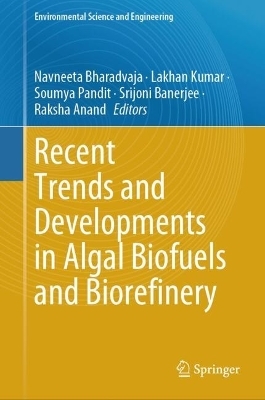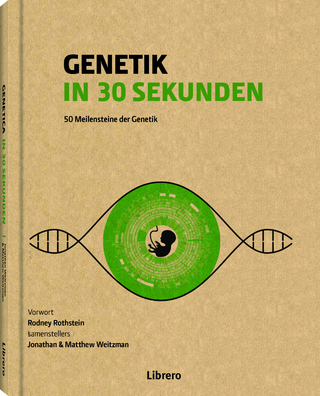
Recent Trends and Developments in Algal Biofuels and Biorefinery
Springer International Publishing (Verlag)
978-3-031-52318-2 (ISBN)
This book presents technoeconomic challenges, recent trends, and developments toward sustainable algal biofuels and biorefinery. The exponential increase in population and thus the demand for energy, the ever-rising threats to climate change with conventional fossil fuels consumption, fluctuations in fossil fuels price and geopolitical instability have made each and every country of the world to think over its energy independence and security by increasing its own domestic energy production and reducing dependence on scarce fossil fuels. The global need to shift towards a sustainable source of energy has led to the discovery of third and fourth generation biofuels, in which microalgae and their genetically modified strains have been exploited. However, these simple photosynthetic organisms are difficult to select and cultivate for the production of biodiesel. Genetic engineering has opened provisions for the introduction of desired traits to such useful strains. There are also scopes for designing of novel photobioreactors (PBRs) having strain-specific physicochemical parameters, adequate CO2 and nutrient supply, and so on. The role of microalgae in CO2 sequestration from the environment is well known fact. Wastewater treatment plants can be used a raceway pond for the microalgal biomass production, and thus, obtained biomass can be used for biofuels and biochemical production.
Mathematical modelling can be used to understand the complex phenomena inside the photobioreactor, which can be a great help to overcome the limitations related to design and scale up of PBRs. Flow hydrodynamics in PBRs has significant effect on the microalgae growth. Computational fluid dynamics (CFD) can be used to study operating and geometry factors in PBRs that influence the flow dynamics, such as the inlet gas flow rate, mixing, mass transfer, reactor geometry. The use of artificial intelligence (AI) particularly artificial neural network model (ANN model), statistical and evolutionary learning-based techniques are some innovative approaches in manipulating and optimizing productivity and costs in algal biofuel production. This book is aimed to bring several aspects of algal biorefinery and microalgal biofuel production, challenges, and future perspective of microalgal biofuel production at a single place.
Dr. Navneeta Bharadvaja is currently working as an Assistant Professor at the Department of Biotechnology, Delhi Technological University, Delhi, India-110042. She has been actively engaged in research and teaching activity for the last 16 years. She has taught courses like Biopharmaceuticals, Plant biotechnology, Genetic engineering, Genetics, Genomics, Bioethics, Biosafety and IPR etc at UG and PG level. She has guided 5 PhD students and more than 100 BTech/MTech/MSc Students for their respective dissertations.Currently 4 students are pursuing PhD under her supervision. She has published more than 100 peer-reviewed scientific articles in the fields of Medicinal and Aromatic Plants, Algal Biotechnology, Bioremediation, and Biofuels. She has two edited books on biogenic nanomaterials and algal biotechnology. She has attended several conferences and workshops and has delivered invited lectures in the area of her research.
Dr. Lakhan Kumar works at the Department of Biotechnology, Delhi Technological University, Delhi, India. He completed his B. Tech in Biotechnology from the National Institute of Technology, Jalandhar, and M. Tech in Industrial Biotechnology from Delhi Technological University, Delhi. He obtained his PhD in Algal Biotechnology from Delhi Technological University, Delhi, India, where he investigated the application of native freshwater microalgae for biodiesel production, accumulation, and enhancement of chemicals of industrial significance, including b-carotene, polyhydroxy butyrate, and lutein; synthesis of biochar and nanoparticles for environmental remediation. He has more than six years of academic and administrative experience. He has supported more than 15 Masters and 10 Bachelors students from Biotechnology, Environmental Engineering, and Mechanical Engineering in completing their dissertations in algal-based biofuel, biochemical production, and bioremediation. He has been awarded the Research Excellence Award from Delhi Technological University, Delhi. He has participated actively in several Training, Conferences, Workshops, and Seminars on recent trends in Biobased resource recovery, bioremediation, nanobiotechnology, and next-generation fuels. Dr. Lakhan Kumar works towards Environmental Sustainability and Energy independence in rural and urban areas by utilizing biomass potential. His interests include Bioenergy, Bioprocess Engineering, Algal Biorefinery, and Remediation of Environmental Pollutants. He has published several peer-reviewed articles and book chapters, majorly in Algal Biofuels, Biorefinery, and Bioremediation. He also holds experience in book editing on domains like algal biotechnology, biochemical engineering, and biological wastewater treatment. He is a reviewer of several reputed journals and a member of a society working on Environmental and Social Development.
Dr. Soumya Pandit is currently working as a senior assistant professor at Sharda University, Greater Noida, Delhi NRC, India. He taught subjects like bioprocess engineering; industrial biotechnology; environmental microbiology and waste management; he pursued his doctoral studies from bioprocess engineering lab, department of Biotechnology, Indian Institute of Technology, Kharagpur, and completed his postdoctoral research work (PBC fellow) in the Department of Desalination & Water Treatment, The Zuckerberg Institute for Water Research (ZIWR), Ben-Gurion University of the Negev under Planning and Budget Commission Fellowship by Govt. of Israel. He is also a recipient of Northwest University, South Arica, post-doctoral fellowship. He has published various papers at international conferences in the area of environmental biotechnology and bioenergy. He has authored 70 research papers in peer-reviewed journals such as (1) bioresource technology, (2) international journal of hydrogen energy, (3) ACS applied materials and interface, (4) chemical engineering journal, (5) biosensor and bioelectronics, (6) ACS environmen
Development of a smart microalgae strain: Selection and successful outdoor large-scale cultivation of robust microalgae strain having high growth rate, high biomass productivity, high lipid content and immunity towards invasion of other microorganisms.- High throughput screening of high lipid yielding strains.- Omics approach for enhanced microalgae biomass production with enhanced concentration of desired biomolecules.- Low-cost cultivation methods.- Development of cost effective, energy efficient and easy to operate biomass harvesting methods and dewatering technologies.- Economic, environment friendly and low-cost lipid extraction methods.- Lipid specific extraction method to minimize the co-extraction of non-lipid fractions.- Lipid extraction methods from wet microalgal biomass.- Simultaneous extraction, separation and characterization of biomolecules from microalgal biomass.- Direct transesterification of microalgal cells.- Real time biochemical profiling during microalgal cultivation.- Cost-effective downstream processing (DSP) of algal biomass for industrial scale biofuels production.- A continuous system of biofuel production from microalgal biomass.- Biorefinery for microalgal biomass at industrial production scale.- Modification in native strains for biofuel and by-products production without affecting the pool of indigenous wild strain verities.- Modification in biosynthesis pathways for specific biomolecules production without compromising with optimum cell growth and specific biomolecule yield.- Modification in environmental conditions for optimum specific biomolecules yield with compromising the cell growth rate and biomass productivity along with cost of production.- Modification in existing algal processing technologies to make it more cost-competitive and suitable to a wide range of algal species.- Development of scalable processing conversion technologies and its integration to biorefinery.- Reduction in production cost of algal biofuel and value-added by-products to current market prices derived from other than algae.- Mass transfer in transesterification as a rate limiting step.- Operational continuity.- Pre- treatment methods for effective resource recovery from microalgal biomass (ultrasound treatment, French pressing, microwave, thermal hydrolysis, enzymatic treatments ).- Development of microalgal cell treatment methods to enhance extractability and bioavailability of therapeutically important biomolecules.- Genetic engineering to improve biosynthesis of a particular cell component.- Proteins to biofuels conversion through engineering nitrogen flux.- Application of chemicals to improve biosynthesis of high-value biomolecules.- Development of cost-effective high yielding cell disruption techniques.- Development of alternative to organic solvents for biorefinery.
| Erscheinungsdatum | 06.07.2024 |
|---|---|
| Reihe/Serie | Environmental Science and Engineering |
| Zusatzinfo | VI, 457 p. 50 illus., 40 illus. in color. |
| Verlagsort | Cham |
| Sprache | englisch |
| Maße | 155 x 235 mm |
| Themenwelt | Naturwissenschaften ► Biologie ► Genetik / Molekularbiologie |
| Technik ► Umwelttechnik / Biotechnologie | |
| Schlagworte | Algal Biodiversity • Recent Technological Developments for Biorefinery • Recent Technological Developments for Sustainable Algal Biofuels • Technoeconomic Challenges • Unit Operations in Algal Biofuels and Biochemical Production |
| ISBN-10 | 3-031-52318-0 / 3031523180 |
| ISBN-13 | 978-3-031-52318-2 / 9783031523182 |
| Zustand | Neuware |
| Informationen gemäß Produktsicherheitsverordnung (GPSR) | |
| Haben Sie eine Frage zum Produkt? |
aus dem Bereich


